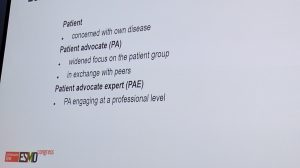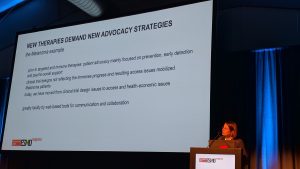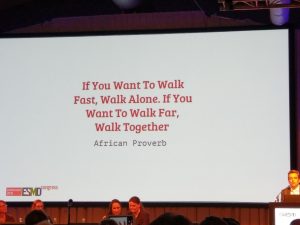Its 7am Copenhagen time…despite the early hour & the fact that my housemates from MPNE are all still sleeping I am awake. I have already had my shower (we are in a shared AirB&B apartment with only 1 bathroom so there always has to be one person that gets up at the crack of dawn in order to get the first slot!)I thought I would take the opportunity to update you.
I think with something as intense & all-consuming as a Cancer congress it won’t be possible to condense this experience into 1 blog post – so I will try to create logic & give you a feel of what something like this is like to attend.
You remember ECCO2015 (almost this time last year – the European Cancer Congress in Vienna. I found that experience epic – ECCO was HUGE. More importantly for me – at that conference I was at an earlier stage in my learning – I found some of the talks baffling & the medical information hard to process. At ECCO we had attended as a group of Melanoma patients alone – and were very much just about learning Melanoma – nothing else mattered.
This time we are at ESMO the European Society for Medical Oncologists. The conference venue is in Copenhagen. It’s equally enormous – 20,000 delegates – and the focus (or how I see it to be) is more upon the oncologists & their own learning.
The interesting thing this time is that we are not just here as Melanoma patient advocates – but Patient Advocates in general.
 Whilst we are here to gain our own individual experiences & attend our own cancer indication tracks, we are also here to attend another track at the event called the patient advocacy track.
Whilst we are here to gain our own individual experiences & attend our own cancer indication tracks, we are also here to attend another track at the event called the patient advocacy track.
Somewhat amazingly, the patient advocacy track at the ESMO conference is the largest track. Engaging with patients & patient centric care in general is hot topic….but the requirement of us as patient delegates is to make one very simple fact clear to those that listen…simply stating “our care is patient centric” or “we are putting the patient first” is no longer enough.
The words are meaningless unless they are followed through with reality. We as advocates need to show & display to the medical profession & to industry (the pharma companies), that we actually do know what we are talking about.
There have been discussions on side effects & how mismanaging this information or not reporting these issues is a problem. 197,000 patients die every year in the EU as a direct result of side effects.
There are talks on Quality of Life issues that really matter to the patient community – issues that are often overlooked as “luxury” after cancer….such as children! Is it really so inconceivable that a patient diagnosed with Cancer in their early 20’s would want children when they are “healed”…and more so, that they would have the right to have children – or at least the right to be given that option. So thereby, conversations about fertility, family planning & the future should be discussed as part of the overall cancer discussion with a patient right from the point of diagnosis.
That might sound daft – but look longer term. A patient is diagnosed – but at an early stage in their very early 20’s….the disease progresses & they are given life saving drugs. The drugs “cure” the patient, but render them infertile. The oncologists know that infertility is a common side effect of the drugs – so as patients we are calling for the patient to be advised about this at the start of their journey – before they even need those drugs & that they are given the opportunity to harvest eggs or sperm whilst they can. The advances in drug treatments & treatment options in general have advanced so much, that patients are “living with cancer” & it’s impact…so we need to ensure we are living well.
There may well have been delegates, or even organisers of ESMO that doubted the importance & relevance of having such a strong patient advocacy program here. Perhaps they thought that other than a token number of non-patient advocates these sessions wouldn’t be as engaging or popular as other sessions.
The patient advocacy sessions have been in general held in the smallest of rooms at ESMO – and yet almost every single session, without fail, has been filled beyond overcapacity – to the point that the organisers have had to organise overflow rooms that have been bigger than the original room the session was set in & even then they have been full!
Listening to patients is no longer a token gesture & our role as patient advocates has changed. A lot of this – especially as Melanoma patients are celebrating the fact that in the last 5 years there have been 10 new drugs come into the marketplace that we can be treated with.
We are no longer just concerned with living – with having any hope of treatment. We still want more treatments (I will talk more specifically about the Melanoma stuff in another blog post), but now we are much more concerned with wider issues – issues like Quality of Life, adverse effects of drugs, access to clinical trials, funding at national & local levels & being heard.
Too many panels & boards still say that they are patient centered – and yet there isn’t a patient on the panel. To many companies say they take the voice of a patient into account…but if they hear that voice & discount it because the request wasn’t phrased in exactly the right terminology…then how is that working.
This conference gave us as patient advocates, the opportunity to connect & learn on a wider scale. To understand that we shouldn’t just concentrate on our own indication, in order to get results for our disease…by using the collective power, influence, ideas & voices of other advocates…we can achieve a greater, quicker, more sustainable impact.
